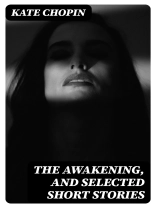Kate Chopin’s ‘The Awakening, and Selected Short Stories’ is a seminal work that probes the intricacies of female independence and self-discovery against the backdrop of late 19th-century America. Through its innovative narrative style, blending impressionistic prose with deep psychological insight, Chopin crafts a story that is both a social critique and a poignant exploration of personal liberation. The titular novella follows Edna Pontellier’s tumultuous journey as she challenges societal expectations, set within the rich cultural context of New Orleans and the Creole society, enhancing its themes of feminist awakening and existential inquiry. Kate Chopin, a pioneer of feminist literature, was born in 1850 in St. Louis, Missouri. Her own experiences as a wife and mother, coupled with the influence of her progressive upbringing, shaped her literary focus on women’s struggles for autonomy. Chopin’s exposure to diverse social circles and her readings in the emerging fields of psychology and sociology undoubtedly fueled her desire to write works that addressed the conflicts faced by women in a patriarchal society. ‘The Awakening’ boldly explores these issues, often drawing from her personal reflections and societal observations. This anthology not only provides a vital insight into Chopin’s narrative mastery but also serves as a timeless exploration of the human spirit’s quest for identity and fulfillment. Readers interested in feminist literature, American realism, or the psychological dimensions of character will find this work not only thought-provoking but essential. Chopin’s eloquent prose invites readers to reflect on the enduring questions of freedom and societal constraints.
เกี่ยวกับผู้แต่ง
Kate Chopin (1850–1904), born Katherine O’Flaherty, was an American author whose work is often categorized within the genre of feminist literature, with themes embracing female independence and the complexities of individual desire. Her most famous novel, ‘The Awakening’ (1899), is a seminal work in early feminist fiction, providing a candid portrayal of a woman’s search for selfhood in a repressive and patriarchal society. Chopin’s writing is remarkable for its narrative economy and its use of local color, characteristic of the literary style of the American South, specifically Louisiana. Although her work won her little acclaim during her lifetime and ‘The Awakening’ was met with much controversy and criticism for its then-unconventional depictions of female sexuality and marital infidelity, Chopin is now celebrated for her pioneering role in the evolution of literary realism and modern feminist narratives. Her short stories, collected in works such as ‘Bayou Folk’ (1894) and ‘A Night in Acadie’ (1897), further exhibit her skill in addressing the issues of race, class, and gender, rendering her one of the most influential writers of the Southern literary tradition. Posthumously, Chopin has gained significant recognition and scholarly attention, ensuring her place in the canon of American literature and the ongoing study of gender and women’s studies.












